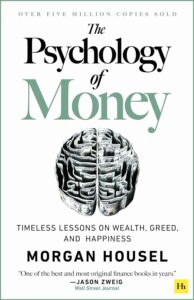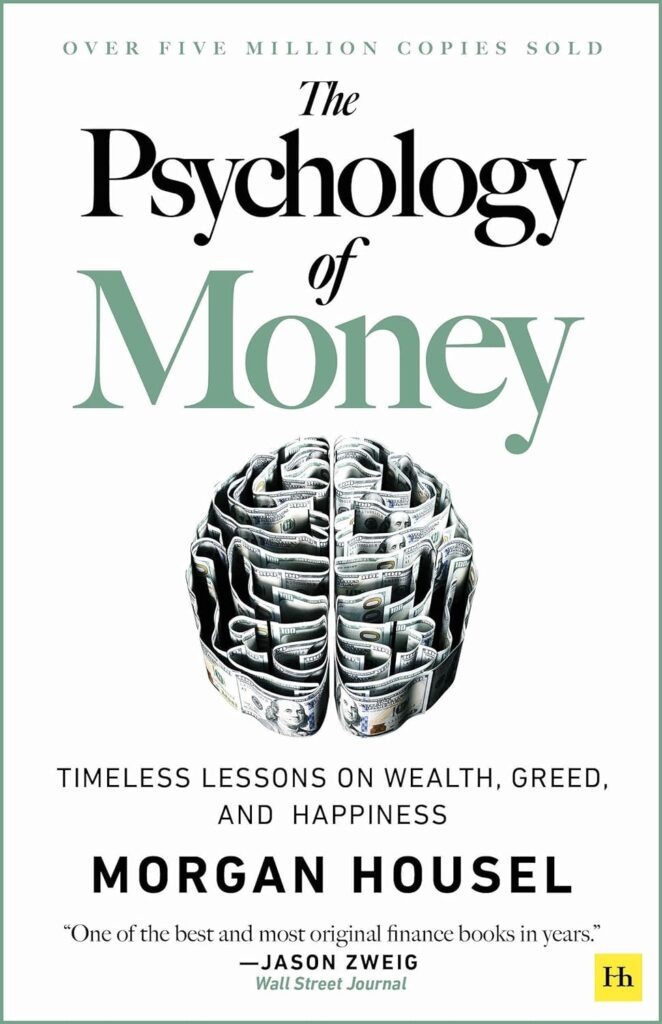The Psychology of Money by Morgan Housel: Summary & Key Notes
Understanding Wealth: The Psychology of Money
We often think that being good with money is all about mathematical skill or savvy investing strategies. However, the truth is much more complex. Understanding money involves an intricate interplay of emotion, logic, and financial decision-making. And that’s where the psychology of money comes into play. Our financial behaviors, how we spend, save, and invest our money, are just as important (if not more) than the amount of money we have. In this article, we delve into these concepts and more, as explained in Morgan Housel’s celebrated book, The Psychology of Money.

Table of Contents
The Importance of Understanding Money Psychology
- Why Matters: Understanding the psychology of money is fundamental to financial success. It forms the backbone of savings, budgeting, and retirement planning. Most importantly, comprehending our money behaviors can help us avoid financial pitfalls and find paths to wealth accumulation.
- Insights: In The Psychology of Money, Morgan Housel gives actionable insights on practical financial success. He implies that a thorough understanding of money psychology can lead to financial prosperity. We’ll unpack some of these insights in the sections that follow.
Defining Money Behavior
It’s easy to think our financial status strictly results from our financial knowledge. Regrettably, that isn’t the case. Our money behavior – the choices we make with our finances – is largely influenced by psychological and social factors, alongside our knowledge about finance.
- Psychological Factors: These include our inherent values, emotional state, and life experiences. They shape our financial behaviors, often in ways we’re not even aware of.
- Social Factors: Society’s influence on our financial decisions can’t be overlooked either. The societal norms and expectations shape our spending and saving habits.
In the following parts, we’ll delve into how emotion and logic influence money behavior, and the correlation between money and happiness.
The Role of Emotion and Logic in Money Decisions
The intertwining of emotion and logic play a critical role in our money decisions. Understanding these factors can shed light on our financial behaviors and help us make more informed choices.
How Emotion Influences Decisions
- Financial Excitement: It’s common to feel a rush of excitement at the idea of a potentially lucrative investment. However, this excitement can sometimes hinder our ability to weigh the genuine risks and rewards.
- Fear of Loss: Just as we can get overly eager about potential gains, the fear of a possible loss can be equally compelling, often leading us to avoid sensible risks.
Logic in Money Decisions
On the other hand, logic in financial decisions involves using concrete data and analysis to guide our actions. It includes:
- Conducting thorough research before investing
- Keeping track of personal cash flow
- Setting aside emergency funds
- Diversifying investment portfolios
Money and Happiness
The correlation between money and happiness has always been a debate. Can money really buy happiness?
The Money-Happiness Connection
- Money as a Means: Money can provide comfort and security, which certainly contribute to happiness. But it’s not the amount of money we have that makes us happy – it’s what we do with it.
- Money and Stress: While money can alleviate financial stress, pursuing it at all costs can lead to physical and emotional exhaustion.
How to Manage Your Money Behaviors
Financial wellness goes beyond merely earning and saving money. It’s about establishing and maintaining healthy money behaviors. Here are some ways to manage and improve your financial habits:
- Develop a Budget: Identify your income and expenses, then create a budget that fits your lifestyle.
- Prioritize Savings: Make saving a fixed part of your monthly budget.
- Avoid Impulse Buying: Take time to consider your purchases, avoiding unnecessary spending.
- Educate Yourself: Read books, take classes, and continually seek knowledge about money management and investment.
Frequently Asked Questions (FAQs)
What is the significance of understanding the psychology of money in personal finance?
Understanding the psychology of money is crucial as it influences our financial behaviors, decisions, and ultimately our financial well-being. It helps in managing emotions towards money to make better financial choices.
How can emotions and logic impact financial decisions according to the psychology of money?
Emotions can lead to impulsive decisions, while logic provides rationality in financial choices. The balance between both is essential as discussed in The Psychology of Money, offering insights on managing emotions for better financial outcomes.
Can money buy happiness as discussed in The Psychology of Money?
The correlation between money and happiness is explored in the book. While money can contribute to certain aspects of happiness, true fulfillment often comes from non-monetary factors such as relationships, personal growth, and experiences.
What practical steps can one take to manage and improve money behaviors?
The Psychology of Money provides actionable steps for managing money behaviors, such as setting financial goals, budgeting, understanding risk tolerance, and developing healthy financial habits for long-term financial stability.
Conclusion:
Understanding the psychology of money is a powerful tool in achieving financial success and overall well-being. By delving into the intricacies of how emotions and logic influence our financial decisions, one can navigate the complexities of personal finance more effectively. Implementing the insights and practical steps from The Psychology of Money by Morgan Housel can lead to a healthier financial status and a more balanced relationship with money. Embrace the journey of financial self-awareness and empowerment to shape a prosperous future.
Discover marketing services, interviews & publishing tools at SharingStories.



